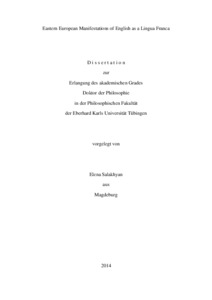|
Eastern European manifestations of English as a Lingua Franca
Salakhyan, Elena
![[img]](https://madoc.bib.uni-mannheim.de/55707/1.hassmallThumbnailVersion/dissertation_printing_bib_2.pdf)  Vorschau |
|
PDF
dissertation_printing_bib_2.pdf
- Veröffentlichte Version
Download (3MB)
|
|
URL:
|
https://madoc.bib.uni-mannheim.de/55707
|
|
URN:
|
urn:nbn:de:bsz:180-madoc-557075
|
|
Dokumenttyp:
|
Dissertation
|
|
Erscheinungsjahr:
|
2014
|
|
Ort der Veröffentlichung:
|
Tübingen
|
|
Hochschule:
|
Eberhard Karls Universität Tübingen
|
|
Gutachter:
|
Kohn, Kurt
|
|
Datum der mündl. Prüfung:
|
22 November 2013
|
|
Sprache der Veröffentlichung:
|
Englisch
|
|
Einrichtung:
|
Philosophische Fakultät > Anglistik I - Anglistische Linguistik (Tracy 1995-2019)
|
|
Lizenz:
|
 Creative Commons Namensnennung 4.0 International (CC BY 4.0)
Creative Commons Namensnennung 4.0 International (CC BY 4.0)
|
|
Fachgebiet:
|
400 Sprache, Linguistik
|
|
Freie Schlagwörter (Englisch):
|
English as a Lingua Franca , Russian English , performance strategies , tense and aspect , lexical creativity
|
|
Abstract:
|
The status and use of English in the countries of the expanding circle has been of significant interest in recent years (Kachru1992, Knapp and Meierkord 2002, Seidlhofer and Widdowson 2009, and many others). The use of English by Slavic speakers, in the contexts of ELF communication, has not been studied before (some studies on English in Russia were conducted by Proshina and Ettkin (2005), Ustinova (2006), and Proshina (2006/2010). The motivation behind this thesis was, thus, to analyze the use of English by Slavic speakers in the context of Lingua Franca communication. The main research interests lay in examining (i) the attitude of Slavic speakers toward English as a Lingua Franca, (ii) the speakers’ self-imposed requirements of performance, such as fluency and grammatical correctness and the realization of them in performance, (iii) the speakers’ strategic behaviour in performance, and, (iv) the lexical and grammatical features emerging in the spoken performance of Slavic speakers.
To answer the research questions, the study drew on the spontaneous spoken production and introspective data elicited by means of semi-structured video-recorded interviews of fifteen to twenty five minutes in duration. Fifteen speakers of Slavic languages with L1 Ukrainian, Russian, Polish and Slovak participated in the study. Whereas the spontaneous production data allowed eliciting the emerging lexico-grammatical features and tracing the speakers’ strategic behaviour, the introspective data gave insight into the speakers’ self-perception in ELF encounters and their attitude toward English used for lingua franca purposes.
The study revealed that Slavic speakers have a positive attitude toward English as a Lingua Franca. None of them, however, named non-native varieties of English as preferred English learning models. Prior to entering ELF encounters, speakers claimed to have imposed such requirements as grammatical correctness and fluency on their performance. The self-imposed requirements of performance manifested in the strategic behaviour of speakers, and the types of performance strategies used by these speakers. Although some performance strategies, such as paraphrase, for example, contributed to improving fluency, they also had a positive affect on grammatical correctness that speakers achieved. Where lexical features in the spoken performance were concerned, they emerged out of the speakers’ use of performance strategies and literal creativity that was involved. The use of temporal and
VII
aspectual devices displayed properties unique to speakers of Slavic languages. The English simple past tended to be used with verbs which were perfective in the speakers’ first languages, and the English present and past progressive with verbs, which were imperfective in the speakers’ first languages. As the English progressive aspect was used for rendering imperfective verbs, it emerged in the progressive non-obligatory context, often with the predicate types of achievements and states, and with events having habitual and repetitive nature. This development caused the overuse of the progressive aspect.
Taking these observations into account, it was possible to claim that the use of English by Slavic speakers shared principles that applied to ELF communication, such as the requirements of performance, and the use of performance strategies, and varied depending on the L1- and L3-specific parameters, such as tense and aspect. In summary, the use of English by Slavic speakers appeared to be a product of an interrelation of various speaker-specific dimensions, such as speakers’ L1, communicative competence in L3, if available, performance requirements, and the beneficial use of performance strategies.
|
 | Das Dokument wird vom Publikationsserver der Universitätsbibliothek Mannheim bereitgestellt. |
 | Dieser Datensatz wurde nicht während einer Tätigkeit an der Universität Mannheim veröffentlicht, dies ist eine Externe Publikation. |
 Suche Autoren in Suche Autoren in
Sie haben einen Fehler gefunden? Teilen Sie uns Ihren Korrekturwunsch bitte hier mit: E-Mail
Actions (login required)
 |
Eintrag anzeigen |
|
